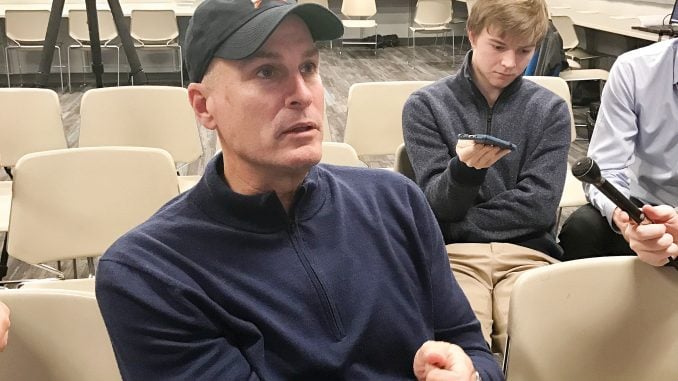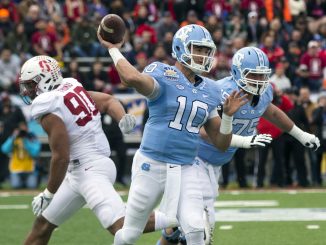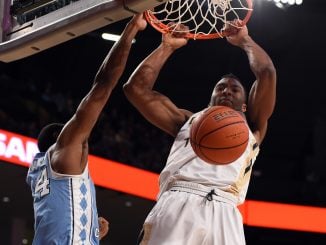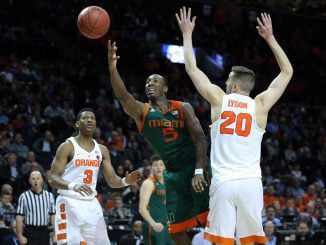
The federal government’s investigation into college sports found that a top player was connected to an agent.
That caused a former Duke basketball star, turned outspoken critic of the NCAA, to lash out at the hand wringing over the player’s actions.
“Players ought to be able to have an agent just like any other American,” he said. “They need them. They’re being ripped off. These young athletes shouldn’t have to take money under the table or deal with shady characters.”
The date was Aug. 26, 1988, 11 years before Wendell Carter Jr. was born. Three decades later, not much seems to have changed, except the name of the Duke alum taking on the NCAA.
While today, Jay Bilas uses Twitter to make his case against the NCAA, back then, it was a former Duke point guard named Dick DeVenzio printing out newsletters at home and mailing them out to more than 300 college athletes around the country.
Not surprisingly, Bilas was influenced in no small part by DeVenzio’s message.
“When I met him he was very much an advocate for athlete’s rights and felt like what the NCAA was doing was profoundly wrong,” Bilas said. “I was the athlete representative on the NCAA’s Long Range Planning Committee at the time, and Dick and I talked a couple of times on some of the issues.”
Bilas was a player at Duke at the time and nowhere near as outspoken as he is today.
“When you’re that age, you kind of know to go along to get along,” he said. “I was, at that time, publicly a very party-line guy. I was rah-rah NCAA, even though I disagreed with a lot of different policies. The things I disagreed with, I was shot down immediately when I brought them up in meetings.”
A 5-foot-10, 155-pound coach’s son from Western Pennsylvania, DeVenzio was one of the top players in the nation when he signed with Duke in the late 1960s.
“I tried to get him to come to West Virginia,” said Bucky Waters, who would later take over the Blue Devils for DeVenzio’s senior year. “He was fearless. Other players were tall, could jump, had long arms. Everything about him was small, except his heart.”
After four years of battling giants on the hardwood, DeVenzio wasn’t afraid to take on the biggest giant around: The NCAA.
“I always thought he’d end up in Washington,” Waters said. “He was a born leader. People rallied around him. He put out — he just didn’t talk. And if you weren’t putting out, he’d let you know.”
The message certainly sounds like it could have come from a Bilas tweet storm. Among other things, DeVenzio said:
“Why can’t the NCAA acknowledge openly that many athletes view their sport as their primary interest in life?”
“Isn’t it amazing — Basketball players wear sneakers — Nikes, Reeboks or Converse — and the coach gets paid? Kids want to wear what the good players wear. I wonder, does anybody ever know the type of wingtips that Dean Smith wears? Are all the little kids walking around in Dean Smith-style wingtips?”
“There’s nothing wrong with having big-time athletics or professional athletics associated with college campuses. We have weapons research. We have people studying kooky religions. We have people doing abstract art. We can have professional athletes.”
“The NCAA turns athletes all over the country into criminals, when everybody in the world has the same desires.”
“When I was critical of the Duke basketball program, people said, ‘Oh, you’re not grateful for the education Duke gave you.’ I don’t see that they gave me anything. They made a good bargain.”
DeVenzio also quoted Martin Luther King’s “Letter from a Birmingham Jail” which introduced a two-question test for whether a law is immoral: Did everyone have a voice in making it? Does it apply equally to the people that made the law?
“By Dr. King’s unequivocal standard, the NCAA rules governing collegiate athletics are clearly immoral,” he concluded.
DeVenzio did more than preach against the NCAA, however. He worked with student-athletes to challenge the system. Starting in the mid-’80s, he tried to convince players to organize.
“We had talked right before the Final Four in 1986,” Bilas said. “We were the No. 1 team in country, and Dick had mentioned, ‘Have you guys ever thought about boycotting the Final Four?’ I just made a joke with him, ‘How about we do it next year?’ That was a nonstarter for me.”
That same year, DeVenzio also attempted to organize a boycott of the Rose Bowl, a one-day walk-out of football practice and a half-hour sit-in to delay the start of a top-five matchup between Oklahoma and Nebraska.
“That was the way he was,” Waters said. “Lead, follow, or get the hell out of my way.”
The Sooner and Husker players said in the days leading up to the game that they were about 50-50 on whether to strike. In the end, however, like DeVenzio’s other attempts to disrupt sports’ biggest events, the kickoff occurred on schedule.
“Fans don’t care how the sausage is made,” Bilas said of the lack of public support for DeVenzio’s revolution. “They just want to see games.”
There also was less support among the players than DeVenzio had hoped.
“Players are transient, even back when they stayed four years,” Bilas said. “In order for a player to do something, walk out, boycott, strike, the player is making a big sacrifice there. Most players aren’t willing to do that. I certainly wasn’t willing to do it. I had profound differences with the NCAA. Those have only heightened over the years. But you’re kind of looking at what’s going to be gained. You’d be taking action for future generations, not for yourself. And for 18- to 21-year-olds, that’s hard to wrap your head around.”
In the 1990s, DeVenzio took things a step further, attempting to come up with a grassroots system to show that college athletes could be paid. He sent out $100 checks to the 100 best college football players in the country, postdating them for Jan. 3, 1994 — the day after their senior season ended. He also attempted to set up a trust fund for Duke basketball freshman Joey Beard, payable after he earned his degree.
“He was doing that stuff to make a point,” Bilas said. “That’s how ridiculous the system was, that you could make a player ineligible, and they’d have to be reinstated, over something so simple and meaningless and silly. And right now, we have the NCAA with its hair on fire over whether someone’s parents had a meal with an agent while he was in high school.”
While 22 players cashed the checks, the plan never gained traction, and, when DeVenzio died of cancer in 2001, his goal of changing college sports seemed far off.
Perhaps his greatest legacy wasn’t the change that he saw in his lifetime, but the generation of athlete activists he helped inspire, including a Duke student-athlete he took aside and tried to convince to skip the biggest game of his career.
“Looking back on it, he was way ahead of his time as far as what he saw,” Bilas said. “The same issues the NCAA is facing now it was facing back then, the exact same issues. Now the tension between the amateurism and the billions of dollars is even more stark. It’s a greater chasm than it was before, but it was a chasm then. But he saw that and clearly knew it was going to be a major issue going forward.”



